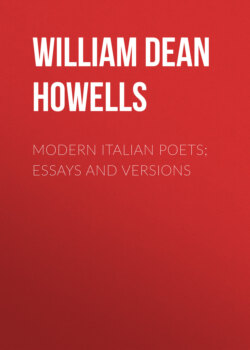Читать книгу Modern Italian Poets; Essays and Versions - William Dean Howells - Страница 4
На сайте Литреса книга снята с продажи.
II
ОглавлениеTable of Contents
The political purpose of literature in Italy had become conscious long before Guerrazzi's time; but it was the motive of poetry long before it became conscious. When Alfieri, for example, began to write, in the last quarter of the eighteenth century, there was no reason to suppose that the future of Italy was ever to differ very much from its past. Italian civilization had long worn a fixed character, and Italian literature had reflected its traits; it was soft, unambitious, elegant, and trivial. At that time Piedmont had a king whom she loved, but not that free constitution which she has since shared with the whole peninsula. Lombardy had lapsed from Spanish to Austrian despotism; the Republic of Venice still retained a feeble hold upon her wide territories of the main-land, and had little trouble in drugging any intellectual aspiration among her subjects with the sensual pleasures of her capital. Tuscany was quiet under the Lorrainese dukes who had succeeded the Medici; the little states of Modena and Parma enjoyed each its little court and its little Bourbon prince, apparently without a dream of liberty; the Holy Father ruled over Bologna, Ferrara, Ancona, and all the great cities and towns of the Romagna; and Naples was equally divided between the Bourbons and the bandits. There seemed no reason, for anything that priests or princes of that day could foresee, why this state of things should not continue indefinitely; and it would be a long story to say just why it did not continue. What every one knows is that the French revolution took place, that armies of French democrats overran all these languid lordships and drowsy despotisms, and awakened their subjects, more or less willingly or unwillingly, to a sense of the rights of man, as Frenchmen understood them, and to the approach of the nineteenth century. The whole of Italy fell, directly or indirectly, under French sway; the Piedmontese and Neapolitan kings were driven away, as were the smaller princes of the other states; the Republic of Venice ceased to be, and the Pope became very much less a prince, if not more a priest, than he had been for a great many ages. In due time French democracy passed into French imperialism, and then French imperialism passed altogether away; and so after 1815 came the Holy Alliance with its consecrated contrivances for fettering mankind. Lombardy, with all Venetia, was given to Austria; the dukes of Parma, of Modena, and Tuscany were brought back and propped up on their thrones again. The Bourbons returned to Naples, and the Pope's temporal glory and power were restored to him. This condition of affairs endured, with more or less disturbance from the plots of the Carbonari and many other ineffectual aspirants and conspirators, until 1848, when, as we know, the Austrians were driven out, as well as the Pope and the various princes small and great, except the King of Sardinia, who not only gave a constitution to his people, but singularly kept the oath he swore to support it. The Pope and the other princes, even the Austrians, had given constitutions and sworn oaths, but their memories were bad, and their repute for veracity was so poor that they were not believed or trusted. The Italians had then the idea of freedom and independence, but not of unity, and their enemies easily broke, one at a time, the power of states which, even if bound together, could hardly have resisted their attack. In a little while the Austrians were once more in Milan and Venice, the dukes and grand-dukes in their different places, the Pope in Rome, the Bourbons in Naples, and all was as if nothing had been, or worse than nothing, except in Sardinia, where the constitution was still maintained, and the foundations of the present kingdom of Italy were laid. Carlo Alberto had abdicated on that battle-field where an Austrian victory over the Sardinians sealed the fate of the Italian states allied with him, and his son, Victor Emmanuel, succeeded him. As to what took place ten years later, when the Austrians were finally expelled from Lombardy, and the transitory sovereigns of the duchies and of Naples flitted for good, and the Pope's dominion was reduced to the meager size it kept till 1871, and the Italian states were united under one constitutional king—I need not speak.
In this way the governments of Italy had been four times wholly changed, and each of these changes was attended by the most marked variations in the intellectual life of the people; yet its general tendency always continued the same.
